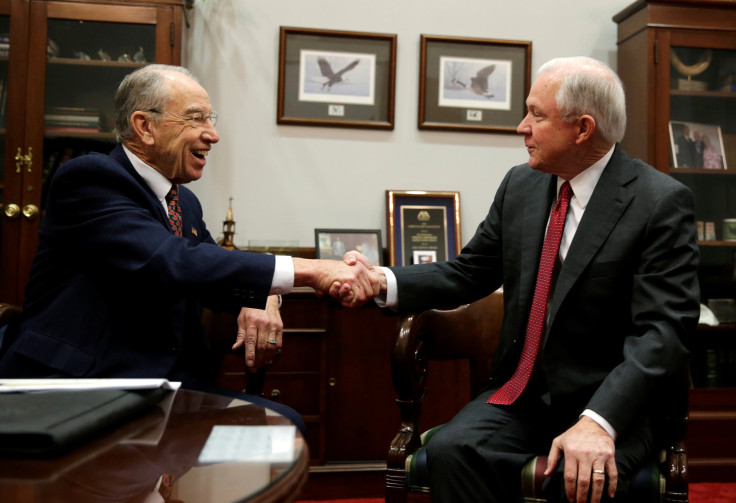Jeff Sessions' Record: Attorney General Confirmation Hearing 'Rigged,' Civil Rights Leaders Say

The confirmation process for Alabama Sen. Jeff Sessions (R-AL) is “rigged” and should be delayed in order to thoroughly vet Donald Trump’s attorney general nominee, a group of civil rights leaders said in a conference call with reporters Friday.
Citing reports that Democrats will be allowed to call only four witnesses to testify at next week’s confirmation hearings, and noting that Sessions left hundreds of questions blank on a required questionnaire, the Rev. Al Sharpton, NAACP president Cornell William Brooks and five other civil rights leaders representing black, Hispanic and Asian-American groups called for a more “thorough vetting” of Sessions’ controversial career, which included a failed nomination to the federal bench in 1986 due to accusations of racial bias.
“Rushing through this hearing…demonstrates a contempt for the need to probe Sen. Sessions’ record,” said Sherrilyn Ifill, president of the NAACP Legal Defense And Education Fund. “The Senate Judiciary Committee cannot push this forward based on their friendship with Sen. Sessions.”
Sessions is a former member of the Senate Judiciary Committee and a four-term senator. His rejected judgeship nomination in 1986 lasted three days and included dozens of witnesses by both sides. Sessions' confirmation hearing next week is scheduled to last just two days.
The civil rights leaders also accused Sessions of hypocrisy for failing to disclose records covering many years. In 2010, he said one of President Barack Obama’s judicial nominees could be charged with a felony for doing the same thing.
.@CornellWBrooks during sit in: "Longevity of Sessions' service isn't in question. The depth of his commitment to #civilrights very much is" pic.twitter.com/OHxDr1YC7C
— court fuller (@courtneygfuller) January 4, 2017
“Given the stakes, we deserve a full and fair process, but instead what we are getting is a rigged process,” said Christopher Kang, director of the National Council of Asian Pacific Americans and a former deputy counsel in the Obama administration. “For more than four years, I was in charge of judicial nominees. And I can tell you, I would never approve a questionnaire like the one that was submitted for Sen. Sessions.”
Many of the leaders voiced concerns over Sessions’ ability, and inclination, to enforce existing laws, especially voting rights laws, as attorney general.
“For Jeff Sessions, a child of Selma, Alabama, to refer to the Voting Rights Act is ‘intrusive,’…to have this man over the Justice Department is a nightmare that we cannot wake up from,” said Sharpton.
Brooks, who was arrested while occupying Sen. Sessions’ Mobile, Alabama office during a protest Tuesday, called Sessions’ use of the word “intrusive” to describe the Voting Rights Act “a racialized dog whistle if anyone ever heard one.”
In 1985, as a U.S. attorney, Sessions prosecuted a group of civil rights activists on charges of voter fraud. The activists were registering elderly black residents to vote in rural Alabama. A jury found the activists, known as the “Marion Three,” innocent after just a few hours of deliberation.
Earlier this week, a spokesperson issued a statement defending Sessions’ record on race.
“Many African-American leaders who’ve known him for decades…have welcomed his nomination to be the next attorney general,” Sessions spokesperson Sarah Flores said in an email. “These false portrayals of Sen. Sessions will fail as tired, recycled, hyperbolic charges that have been thoroughly rebuked and discredited. ”
The civil rights leaders also expressed concern about Sessions’ stances on immigration, mass incarceration and police reform, among other issues that the attorney general is intimately involved with as the government’s chief law enforcement official.
Sharpton and Brooks vowed to continue to use activism to ensure Sessions’ history is properly examined during his confirmation hearings. Brooks said Tuesday’s actions in Mobile were not a “one-off” and that the NAACP would continue to oppose Sessions.
“There will be season of civil disobedience around the Sessions nomination,” Sharpton said.
© Copyright IBTimes 2024. All rights reserved.






















